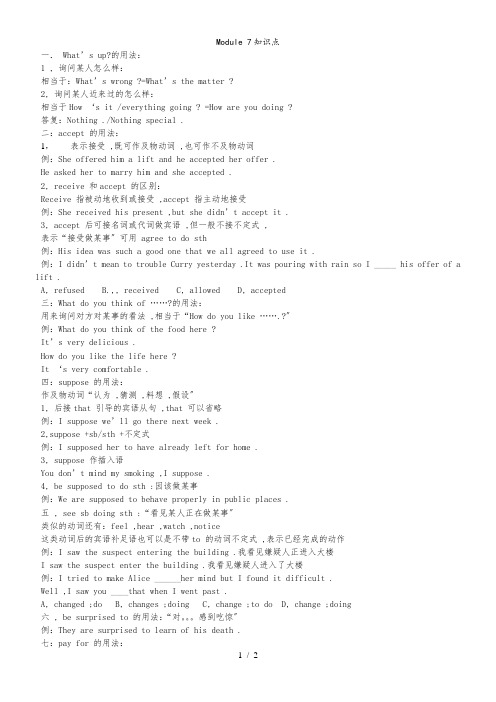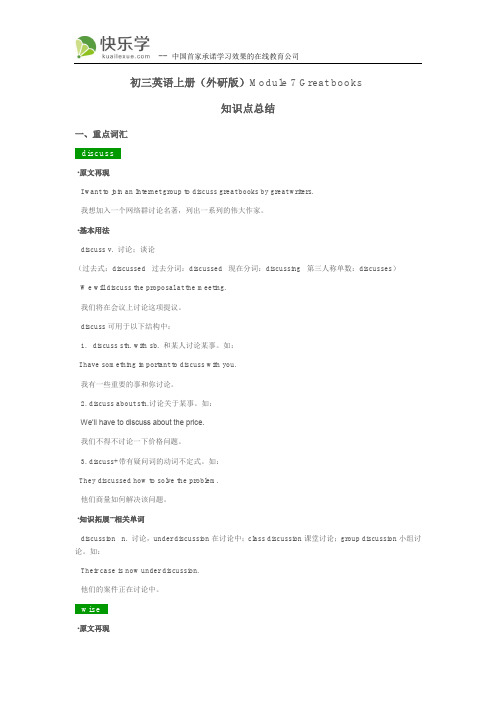初三上Module7
- 格式:doc
- 大小:93.50 KB
- 文档页数:13

Module 7知识点一. What’s up?的用法:1 , 询问某人怎么样:相当于:What’s wrong ?=What’s the matter ?2, 询问某人近来过的怎么样:相当于How ‘s it /everything going ? =How are you doing ?答复:Nothing ./Nothing special .二:accept 的用法:1,表示接受 ,既可作及物动词 ,也可作不及物动词例:She offered him a lift and he accepted her offer .He asked her to marry him and she accepted .2, receive 和accept 的区别:Receive 指被动地收到或接受 ,accept 指主动地接受例:She received his present ,but she didn’t accept it .3, accept 后可接名词或代词做宾语 ,但一般不接不定式 ,表示“接受做某事〞可用 agree to do sth例:His idea was such a good one that we all agreed to use it .例:I didn’t mean to trouble Curry yesterday .It was pouring with rain so I _____ his offer of a lift .A, refused B.,, received C, allowed D, accepted三:What do you think of ……?的用法:用来询问对方对某事的看法 ,相当于“How do you like …….?〞例:What do you think of the food here ?It’s very delicious .How do you like the life here ?It ‘s very comfortable .四:suppose 的用法:作及物动词“认为 ,猜测 ,料想 ,假设〞1, 后接that 引导的宾语从句 ,that 可以省略例:I suppose we’ll go there next week .2,suppose +sb/sth +不定式例:I supposed her to have already left for home .3, suppose 作插入语You don’t mind my smoking ,I suppose .4, be supposed to do sth :因该做某事例:We are supposed to behave properly in public places .五 , see sb doing sth :“看见某人正在做某事〞类似的动词还有:feel ,hear ,watch ,notice这类动词后的宾语补足语也可以是不带to 的动词不定式 ,表示已经完成的动作例:I saw the suspect entering the building .我看见嫌疑人正进入大楼I saw the suspect enter the building .我看见嫌疑人进入了大楼例:I tried to make Alice ______her mind but I found it difficult .Well ,I saw you ____that when I went past .A, changed ;do B, changes ;doing C, change ;to do D, change ;doing六 , be surprised to 的用法:“对。

初三英语上册(外研版)Module 7 Great books知识点总结一、重点词汇discuss·原文再现I want to join an Internet group to discuss great books by great writers.我想加入一个网络群讨论名著,列出一系列的伟大作家。
·基本用法discuss v. 讨论;谈论(过去式:discussed 过去分词:discussed 现在分词:discussing 第三人称单数:discusses)We will discuss the proposal at the meeting.我们将在会议上讨论这项提议。
discuss可用于以下结构中:1. discuss sth. with sb. 和某人讨论某事。
如:I have something important to discuss with you.我有一些重要的事和你讨论。
2. discuss about sth.讨论关于某事。
如:We’ll have to discuss about the price.我们不得不讨论一下价格问题。
3. discuss+带有疑问词的动词不定式。
如:They discussed how to solve the problem.他们商量如何解决该问题。
·知识拓展--相关单词discussion n. 讨论,under discussion在讨论中;class discussion课堂讨论;group discussion小组讨论。
如:Their case is now under discussion.他们的案件正在讨论中。
wise·原文再现He was a very wise man.他是一个很英明的人。
·基本用法wise adj. 有判断力的;明智的,在句中可以作定语,也可作表语。
如:To a wise person, time is like a diamond.时间对一个有智慧的人而言,就如钻石般珍贵。


第13讲Module 7 词汇篇__________________________________________________________________________________ __________________________________________________________________________________第七模块重点词汇和短语词汇和词组1.What’s up?What’s wrong?What’s the matter? + with sb. /sth. 某人/某物有某事2. more… than… 与其说…不如说…3. discuss v. 讨论n. discussion -- have a discussion 进行讨论4.make sense合情理;明智,有意义make sense to sb. /sth. 对某人/某物有意义That does not make sense to me. 那对我没意义。
5.influence sb. / sth. 影响…have an influence on sb. /sth. 对…有影响I don’t want to influence you.He has a great influence on the government.6.by the way顺便问一下7.Why don’t you do sth.?Why not do sth.? 为什么不做某事?8.not as/so..as... 不如.......9. get into trouble遇上麻烦10. in the middle of 在......中间/中部11. escape from… 从…逃跑12. for a time 一度,一时,一段时间13. be surprised to do sth.对做某事感到惊讶be surprised at sth. 对某事感到惊奇in surprise 吃惊地,惊奇地to one’s surprise 令某人吃惊的是14.more than + 名词不只是,不仅仅是Bamboo is used for more than building.15. pay for (sth.)为…付钱;为.....付出代价How much did you pay for the book?You will have to pay for what you have done.16. in everyday English用日常英语17. It is thought to be = People think that 人们认为18. in the form of以......的方式,以.......的形式My garden is in the form of a square.19.grow up成长,长大20.all the time总是,一直21. laugh at sb. 嘲笑某人smile at sb.对菒人微笑22. turn the situation round扭转局势23. in return作为回报I sent him a present in return for his help.24. be included in被包括在.......中25. for free无偿,免费You will get a book for free.26.be supposed to do sth. = should do sth.应该做某事27.live with sb.和某人一起生活28.run away逃跑,逃走29.take away拿走,带走30. Part of = a part of 一部分31.get lost迷路,丢失32.miss school缺课,逃学用法集萃1. What's up?什么事?2. describe ...as...把....描绘成....,把......说成......3. I suppose (that)+从句我猜想4. Why don't you do...?你为什么不.....呢?5. It's a pity that+从句遗憾的是.....6. be pleased to do sth很高兴做某事1. They were so____at some kangaroos were jumping alongside our car.A surprising B.surprised C.surprise D.a surprise2. The woman had a car accident and she managed to escape________the burning car.A.withB.toC.fromD.at3. This medicine will last________,but after six months you’ll need to change it.A.for a timeB.in timeC.at that timeD.from time to time4.—Xiao Jie is a good friend indeed. He is always there whenever I am________ .—I think so. He is just like the cute Baymax (大白).A.in troubleB.in styleC. in orderD. in return5. I’m pleased ________ you again.A. seeB. seeingC. sawD. to see解析:1.B be surprised at 对......感到惊讶surprisin 令人惊讶的surprise 动词或者名词2. C escape from 从......逃离,固定搭配3. A for a time 一段时间in time 及时at that time 在那个时候from time to time 有时4. A in trouble意为“陷入困境,遇上麻烦”;in style意为“别具风格地;时髦地”;in order意为“井然有序”。


九年级上英语module7Be up to 忙于某事Do a project about 做关于什么的项目Have a look at 看一眼In the centre of 在什么的中心Buy the way 顺便说In the way 障碍On the way to 再去什么的路上On one’s way back(from) 在(从)回来的路上Side by side 肩并肩By the side of 在什么的边上Would you like a hand+to do 你需要帮忙做某事吗By hand 手工制作In hand 处于什么的掌控中Hand in hand 手拉手On one hand 一方面On the other hand 另一方面Be famous for 因为什么而知名Be famous as 做为什么而知名Be famous to 对什么受欢迎In detail 详细的At the moment 此时On the first day 第一天Be surprised at 对什么感到吃惊At different times of the day 在一天的不同时段In many way 在许多方面Be similar to 与什么相似Love doing sth. 喜欢做某事Over here 在这里In the fields 在田里On the hills 在山上Be more like 更像Be full of 充满Speak English 说英语The next day 第二天Arrived at 到达Go on a camel ride 去骑骆驼Kept doing 保持做某事Take the plane 乘飞机。
九上Module7 Great books一、课内基础必背单词discuss [dɪˈskʌs] v. 讨论,谈论thinker [ˈθɪŋkə] n. 思想家wise [waɪz] adj. 有判断力的,明智的review [rɪˈvju:] n. 评论(文章)influence [ˈɪnfluəns] v. 影响,作用于sense [sens] n. 道理,意义,合理性suppose [səˈpəʊz] v. 猜想,推测,相信,认为well-known ['wel'nəʊn] adj.众所周知的,著名的adventure [ədˈventʃə] n. 冒险(经历)escape [ɪˈskeɪp] v. 逃离,逃脱cave [keɪv] n. 洞穴dead adj. 死的,去世的neighbour ['neɪbə] n. 邻居funeral [ˈfju:nərəl] n. 葬礼surprised [səˈpraɪzd] adj. 惊奇的,惊讶的alive [əˈlaɪv] adj. 活着的southern [ˈsʌðən] adj. 南方的state [steɪt] n. 州,邦action [ˈækʃn] n. 举止,行为,情节everyday [ˈevrideɪ] adj. 日常的,普通的dialogue ['daɪəlɒɡ] n. 对话必背短语make sense 易理解,合情理,有意义by the way 顺便提一下get into trouble 遇上麻烦run away 逃走,逃跑for a time 一小段时间,一度,一时pay for 为……付出代价经典句型1. What’s up? 怎么了?2. Well, maybe…嗯,也许……3. I suppose that…我认为……4. Why don’t you…你为什么不……5. I accept that…我同意……重点词句1.【课文原句】We’re still influenced by Confucius’s ideas, and Shakespeare’s plays also make a lotof sense to us today.【用法】influence 此处用作及物动词,意为“影响;作用于”,后接名词或代词作宾语。
外研版九年级英语上Module7...第一篇:外研版九年级英语上Module7Great books unit 1We“re still influenced by Confucius”s ideas.[定稿]Module7 Great books Unit1 we’re still influenced by Confucious’s ideas.学案学习目标一、知识目标正确使用以下单词、短语交际用语及句子⌝单词、短语:discuss,works,thinker,wise,influence,make sense,by the way,suppose,well-known ⌝交际用语:(1)what’s up?(2)well,maybe(3)I suppose(4)why don’t you ⌝句子(1)We’re still influenced by Confucius’s ideas.(2)Their works are still read by many people today.二、语法目标一般现在时的被动语态(is,am,are+done)学习过程:一.课前延伸: Read the new words before class 二.课内探究 Step 1 Lead inLook at the pictures.Say who the people are.Step 2 Listening1.Listen and complete 1).Confucius is well-known in_____________.2).Shakespear wrote____________________.3).Mark-Twain’s stories are set____________of the US.Step 3 Listen and read.1.Listen to the conversation and match the people with the descriptions.(P57)2.listen again and check True or False 1).Both Betty and Mr Jackson think that Confucius and Shakespeare are great writers.2).Confucius and Shakespeare lived hundreds ofyears ago, so people are influenced little by them now.3).Mr Jackson thinks Mark Twain is as great as Confucius.4).Betty wants Mr Jackson to join the Internet group to discuss great books.3.Read the conversation and answer: 1).What does Betty want to do?2).Does Mr Jackson agree with Betty about the great books?3).Why does Mr Jackson think Confucius and Shakespeareare great?4).What does Betty think of Mark-Twain?5).Who wrote The Adventures of Tom Sawyer?6).Are Mark-Twain’s books still popular?4.Read again and complete: 1).what’s up?中文是____________,表达同样的意思还可以_____________________表达。
第15讲Module 7 语法篇____________________________________________________________________________________________________________________________________________________________________一般现在时的被动语态一般现在时的被动语态一、·英语语态有主动语态和被动语态两种。
主语是动作的执行者,叫主动语态。
如:We clean the classroom.我们打扫教室。
·主语是动作的承受者,叫被动语态。
如:The classroom is cleaned(by us).教室被(我们)打扫。
二、被动语态的构成:助动词be+及物动词的过去分词+(by+宾语)· 其中by意为“被……;由……”,表动作的执行者。
如:The glass is broken by that boy.玻璃杯是那个男孩打破的。
·be有人称、数和时态的变化,其肯定式、否定式、疑问式的变化规则与be作为连系动词时完全一样。
如:English is widely spoken around the world.(肯定式)English is not widely spoken around the world.(否定式)Is English widely spoken around the world?(疑问式)Yes,it is./No,it isn’t.三、被动语态的用法:· 在没有指明动作的执行者或者不知道动作执行者的情况下可用被动语态。
如:This coat is made of cotton.这件大衣是棉制的。
·要强调动作的承受者而不是执行者时,用被动语态。
如:Her bike is stolen.她的自行车被偷了。
Module 7 AustraliaUnit 1 I’m looking for the photos that you took inAustralia.导学案学习目标:A. 知识目标:1、掌握单词及短语。
2、初步理解that引导的限定性定语从句。
3、掌握感叹句的语调。
B. 能力目标:1、能够听出他人所描述的旅游经历细节。
2、能够介绍参观过的某个地方。
C. 情感目标:1、要努力学习,将来能去外国2、交谈经历时能注意他人的情感,不因别人不能周游世界各地而蔑视,要表现关怀与平等。
D. 策略目标:学生自主思考和合作学习结合重难点:1. 掌握本课重点单词和固定表达。
2. 初步理解that引导的限定性定语从句。
学习过程:一.听前说1. 检查词汇预习根据句意及首字母填词。
a. Are there any s___________ or c____________ in Australia? They all eat meat. I’m afraid of them.b. Don’t run a_____________ the bus or car. It’s dangerous.c. Would you like a h_______ to finish the work?d. Can you tell me more d___________ about the traffic accident?2. 根据上网或书籍而搜寻到的,简单介绍Australia。
3. 展示that引导的定语从句a. Can you describe the photos?就每幅图片说出两个句子,并将它们用that连接起来。
b. 问:定语从句是否是一个完整的句子?定语从句所修饰的词或短语被称为先行词,先行词既可为人也可为物,找出这两个句子的先行词,能否再将定语从句和先行词还原成一个完整的句子?小组讨论c. 用that 将下列每题中的两个句子连成一个复合句.(1)I love the animals.The animals are kind and friendly.(2)Australia is a country. It has the most beaches.(3)This is a huge rock.The huge rock is in the centre of Australia.(4)I am collecting the photos .I took the photos in Qinghua University.二. 听中说a.Listen and answer the questions.(1). Which country has Tony decided to go to?(2). Which places can you hear?(3) Which animals can you hear?b. Do Activity 1 in pairs.c. Listen again and check your answers.d. Do Activity 4. Check answers in pairs in English. Then check them together in class.e. Do Activity 5. Check answers in pairs in English. Then check them together in class.f. Do Activity 6. Check answers in groups in English. Then check them together in class. Fill in the blanks.三. 听后学a. 在对话中找出相应的英语。
1.做一个课题2.看一眼某物3. 在……的中心4.它是奇妙的!5.真神奇啊!6.伴着车跳跃7.在某人回来的路上8. 照相b. Answer the questions below in groups.1 What are you up to? 这是口语英语,类似意思的表达还有_________________________2 Would you like a hand to help them?would like 后加动词的什么形式?想要某物如何表达____________想要某人干某事如何表达________________________,还有一后面加动词的ing的想要做某事如何表达_______________________eg._______________________________3 I bet you do means________________________.4. You can borrow it.borrow…______... eg._________________________________lend …_______... eg._________________________________c. Read and fill in the blanks.Tony was looking for the photos ____ ____ _____ _____ _____ ______ .He wasgoing to write about this country. His father helped him find three pictures. One was a huge rock _____ _____ _____ _____ in the centre of Australia. One was the Sydney Opera House. The last one was a photo of a Shark _____ _____ _____ _____ on the Great Barrier Reef. Tony′s dad also saw some kangaroos_____ _____ _____ _____ _____ _____ on their way back from Uluru. At last Tony borrowed dad′s camera because he would take part in a photo competition _____ _____ _____ _____ _____.d. 释疑解惑:不懂的问题找出来,讨论一下,问一问。
e. According to Activity 4, describe Australia simply.D.学以致用1. 设想你也去了你最喜欢的某个国家或地方,然后描述一下那个地方,小组交流,采用多种多样的形式展现出来。
2. 总结回顾,以小组为单位讨论。
3.当堂检测,及时反馈矫正。
将下列句子组合成定语从句。
a. We saw a tree. It was thousands of years old.b. The car was big. We traveled in a car.c. My father is that tall man. The man is standing under the big tree.三、课后作业1、复习巩固a. 整理课堂笔记,掌握新词汇、that引导的定语从句。
b. Do Activity 1 and 2 on Page 136.2. 分层作业a. 能够向他人介绍Australia(必做)。
b. 能够向他人介绍自己喜欢的国家(选做)。
3. 预习任务预习Unit 2的新词汇Module 7 AustraliaUnit 2 The camel that I rode had a bad temper.导学案学习目标:知识目标:1、掌握本单元的词汇和短语。
2、继续学习that引导的定语从句。
能力目标:1、掌握that引导的定语从句的使用。
2、能够读懂旅游介绍的文章,理解语篇主题和细节。
3、能够用定语从句描写自己的旅游经历,能用短语等表明事情发生的先后顺序。
情感态度:1、能够介绍中国的文化景点,增强民族意识。
2、通过阅读了解不同国家的风景,了解其不同的自然与文化。
策略目标:学生自主思考和合作学习结合重难点:1、本单元的词汇和短语2、掌握that引导的定语从句的使用。
学习过程:一.读前导1. 检查词汇预习同桌三分钟相互检查,并将不会的写下来2. Do Activity2. According to the pictures, Say something about Australia.二、读中读1.Read and put the following into the right order.a. Going on a camel rideb. Flying to Sydneyc. Taking a helicopter tourd. Walking around Uluru2.Read Paragraph 1 and answer the questions.a. When the writer see the big rock, what was the writer surprised at?b. What is the Aboriginal name for Ayers Rock?c. What transportation did Tony take on the first day?d. What color do the rocks show at different times of the day?e. What do the Aboriginal stories describe?3. Read Paragraph 2 and answer the questions.The Australians are like British man in many ways. Can you give us some examples?b. What sports do they like most?4. Read Paragraph 3 and 4 and answer the questions.What’s the weather like there in Dec. ?b. What language do Australians speak?c. When we say “Hello”and “Don’t worry about it”, how do Australians say?5. Read Paragraph 5 and 6 and answer the questions.a. What did the writer do the next day after they arrived at Uluru?b. Why did the writer get very tired when he went on a camel ride?c. How did the writer go back to Sydney?6. Do Activity 5.7. Do Activity 6.三.读中学:A. 请同学们在课文中翻译下列短语。